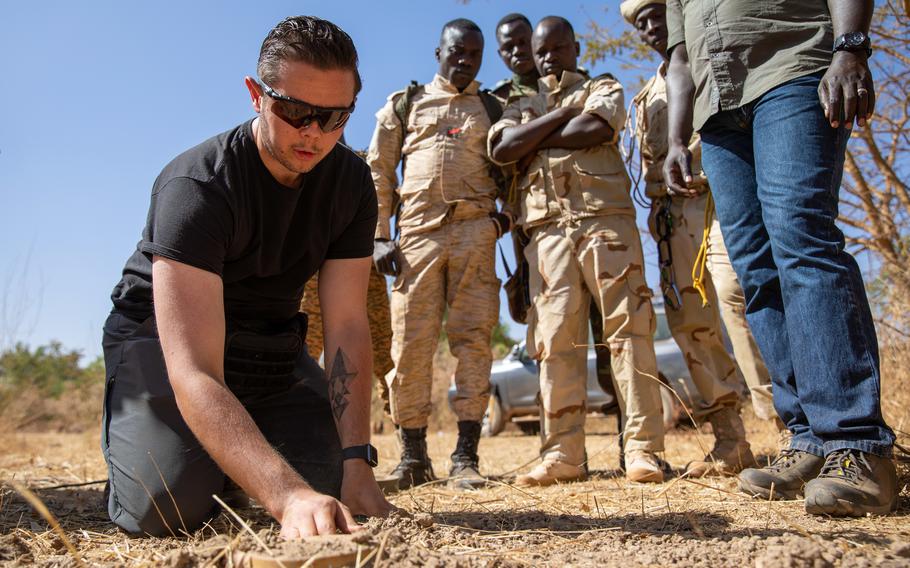
Spc. Zachery Azpeitia, with the 763rd Ordinance Company, gives a class on remote removal of land mines in February 2021 to Burkinabe soldiers at a base on the outskirts of Ouagadougou, the capital of Burkina Faso. U.S. forces will now receive danger pay on deployment to the country, where Islamic militants hold sway and government security forces have been accused of human rights violations. (Nathan Hammack/U.S. Army)
STUTTGART, Germany — Burkina Faso, a West African country where Islamic militants are expanding their reach, has been added to the places where U.S. troops will receive danger pay given the risks they now face on deployments.
The country has experienced two recent military coups and faces growing insurgencies. There also are indications of meddling by Russia’s Wagner Group, a private army that’s active in neighboring Mali.
“Burkina Faso presents our military personnel with threats from violent extremist organizations and mercenary forces that can quickly escalate and spread with little to no warning,” U.S. Rep. Jimmy Panetta, D-Calif., said in a statement Friday.
Panetta is part of a group of lawmakers who have been calling on the Pentagon to expand benefits for troops sent to the broader Sahel region, where U.S. troops routinely carry out training and advisory missions.
“Given the instability in the region and the terrorist activities of both al-Qaida and the Islamic State within Burkina Faso, it is important to recognize the risks our men and women in uniform face,” U.S. Rep. Austin Scott, R-Ga., said in the statement.
Panetta’s office said it was informed last month that Imminent Danger Pay for troops sent to Burkina Faso was in effect. While not a cash windfall, Imminent Danger Pay adds up to an additional $225 per month in a service member’s paycheck and will be effective retroactively to February 2022.
The Stuttgart-based U.S. Africa Command had requested the pay change more than a year ago, Panetta’s office said.
In addition, the lawmakers are calling on the Defense Department to designate Burkina Faso, Mali, Niger and Chad as qualified hazardous duty areas with tax exclusion benefits, given the security risks in the broader region, Panetta said.
The push comes as conditions deteriorate in Burkina Faso and other Sahel countries, such as Niger and Mali, all of which are grappling with insurgencies.
AFRICOM’s Gen. Michael Langley testified before senators in March that West Africa is at a “tipping point.”
Numerous countries in the region need more U.S. support in the form of training and equipment, but the approval process is moving too slow for countries that have terrorist affiliates “at their back door,” Langley said.
Panetta said U.S.-designated terrorist groups such as al-Qaida affiliate Jama’at Nusrat al-Islam wal-Muslimin and the Islamic State in the Greater Sahara now control much of Burkina Faso. France withdrew its personnel from the country last year after Burkina Faso ordered French special operations troops to leave.
As a result, U.S. forces “are expected to shoulder additional burdens as they confront terrorist and mercenary threats,” Panetta’s office said.
In West Africa, the U.S. is focused on training and advisory initiatives aimed at boosting the capabilities of local forces in their battles against an array of militant groups.
In 2022, AFRICOM deployed or put forces on alert more than 20 times. And with unrest on the rise in West Africa, the “demand for crisis response will also trend upwards,” Langley said in his 2023 posture statement issued in March.